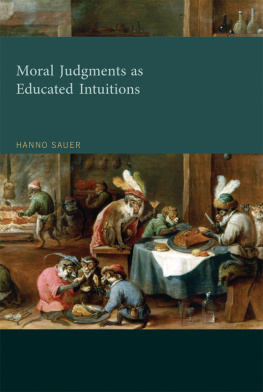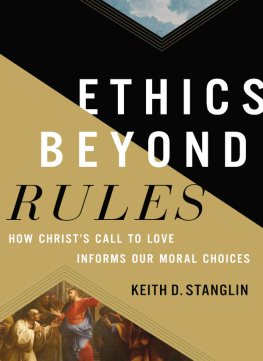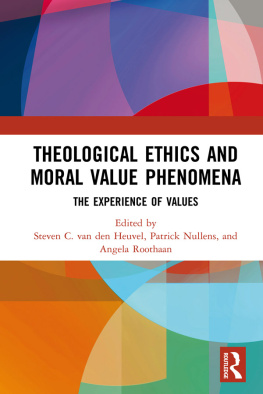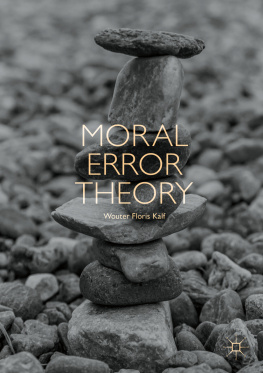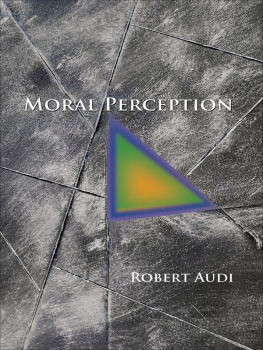Moral Judgments as Educated Intuitions
Hanno Sauer
The MIT Press
Cambridge, Massachusetts
London, England
2017 Massachusetts Institute of Technology
All rights reserved. No part of this book may be reproduced in any form by any electronic or mechanical means (including photocopying, recording, or information storage and retrieval) without permission in writing from the publisher.
This book was set in Stone Sans and Stone Serif by Toppan Best-set Premedia Limited. Printed and bound in the United States of America.
Library of Congress Cataloging-in-Publication Data
Names: Sauer, Hanno, author.
Title: Moral judgments as educated intuitions / Hanno Sauer.
Description: Cambridge, MA : MIT Press, 2017. | Includes bibliographical references and index.
Identifiers: LCCN 2016023438 | ISBN 9780262035606 (hardcover : alk. paper)
eISBN 9780262337243
Subjects: LCSH: Judgment (Ethics) | Ethics--Psychological aspects. | Emotions. | Ethical intuitionism.
Classification: LCC BJ1408.5 .S38 2017 | DDC 170/.42--dc23 LC record available at https://lccn.loc.gov/2016023438
ePub Version 1.0
For Mina
Acknowledgments
This book grew out of a dissertation I wrote between 2009 and 2013 at the Universities of Leiden and Groningen. I would have neither started nor finished this project had it not been for my supervisor, Pauline Kleingeld, and her encouraging feedback, moral support, and friendly tenacity. When I arrived in the Netherlands in May 2009, she had done most of the important work already; I only had to fill in the gaps. I hope I did not depart too much from her Kantian proclivities, but I am confident that she will tolerate whatever heresy I have come up with.
I also wish to thank NWO (the Netherlands Organisation for Scientific Research) for their generous funding of the project Morality beyond Illusions? Re-assessing the Philosophical Implications of Empirical Studies of Moral Agency, of which I was part. The time I spent working on our project in Leiden was one of the most exciting and stimulating periods of my life. I want to thank Markus Schlosser, from whom I learned more than he knows, and Tom Bates, from whom I learned less than he thinks.
I am indebted to the following whose support, feedback, and suggestions make them partly responsible for the mistakes that can be found on the pages below: Joel Anderson, Mark Alfano, Alexander Bagattini, Bert Bos, Wout Cornelissen, Sabine Dring, Julia Driver, Fabian Eck, Yvonne van Eijk, Thomas Fossen, Hedwig Gaasterland, Victor Gijsbers, Sean Gould, Carolyn de Greef, Thomas Grundmann, Frank Hindriks, Daniel Jacobson, Lies Klumper, Antti Kauppinen, Jouni Kuukkanen, Joseph Heath, Anthonie Meijers, Tiffany Meshkat, Marijana Milosavljevic-Vujosevic, Sven Nyholm, James Pearson, Jeroen van Rijen, Scott Robbins, Philip Robichaud, Sabine Roeser, Herman Siemens, Bart Streumer, Alan Thomas, Peter Timmerman, Bruno Verbeek, Jonathan Webber, and all the others whom Ive forgotten. I do not thank my landlord.
I received a lot of helpful comments from audiences at various conferences and colloquia in Amsterdam, Barchem, Cardiff, Eindhoven, Groningen, Leiden, Milan, Rotterdam, Tilburg, Toronto, Tbingen, Utrecht, and Zrich. I also wish to thank my students at Leiden and Tilburg, from whom I have learned much. I would also like to thank Philip Laughlin for his generous and professional support, and three anonymous reviewers at the MIT Press for their constructive and sympathetic comments. I am grateful to Matthias Warkus for preparing the index.
Special thanks go to Jeanette Kennett, Maureen Sie, and Jesse Prinz for reading the whole manuscript, for agreeing to serve on my committee, and for the valuable advice they have given. I am grateful to Jesse Prinz for hosting me at the CUNY Graduate Center and the time and effort he put into reading and commenting on my biweekly produce, to Axel Honneth, for hosting me at Columbia University, and to both for giving me a reason to spend three months in New York City.
I owe a lot to my academic teachers at Marburg and Frankfurt. Peter Janich, Udo Tietz, Marcus Willaschek, and my MA supervisors Axel Honneth and Rainer Forst all profoundly shaped my philosophical views. I see their influence on every page of this book, even if they may not.
I also feel the need to thank many people I may have never met and perhaps never will, in particular the anonymous referees from various journals whose insightful comments I benefited from. This book is much better because of them.
I have reused material from previously published articles. Chapter 1 is based on Social Intuitionism and the Psychology of Moral Reasoning, Philosophy Compass 6 (10): 708721; chapter 2 draws on material from Educated Intuitions. Automaticity and Rationality in Moral Judgment, Philosophical Explorations 15 (3): 255275; chapter 4 is based on The Wrong Kind of Mistake: A Problem for Robust Sentimentalism about Moral Judgment, Journal of Value Inquiry 48 (2): 247269; chapters 5 and 6 reuse portions of my Psychopaths and Filthy Desks. Are Emotions Necessary and Sufficient for Moral Judgment? Ethical Theory and Moral Practice 15 (1): 95115; and finally, chapter 7 is based on Morally Irrelevant Factors: Whats Left of the Dual-process Model of Moral Cognition? Philosophical Psychology 25 (6): 783811. I am grateful to the editors and publishers of the above journals for granting me permission to use this material.
I want to thank my family and friends. My parents always allowed my interests to thrive; I thank them for making me a philosopher and, a fortiori, an utterly useless member of society. I want to thank my brothers, David and Moritz, for being there and supporting me. I thank my parents- and siblings-in-law, Nono, Aida, Benko and Vera. Most of all, I want to thank my wife, to whom this book is dedicated. Minawir beide.
Introduction
1The Fork
In eleventh-century Venice, the doge married a Greek princess with peculiar habits: when she ate, she used a small golden tool with two tines to carry her food from the plate to her mouth. This toolnowadays referred to as a forkwas unheard of at the time, and when word got around about her deviant behavior, it sparked a considerable scandal among the honest Venetians. The dogaressa died of a vicious disease shortly afterward; meanwhile, the citizens of medieval Venice unanimously greeted the poor princesss fate with approval, seeing her early death as divine punishment for the sinful delicacy of her manners.
Why did they care so much about the fork? The Venetians did not seem to be merely puzzled by the princesss unusual behavior, but genuinely outraged by her precarious diligence. They were not annoyed by what she had done, nor did they deem it imprudent; they did not, as far as we know, think it harmful to themselves or any other person. And they certainly were not afraid of it. They simply found the way she deviated from the norm to be appalling and offensive. In short: they thought it was morally objectionable.
Morality is no joke. People kill and die for it. It pervades our livesit shapes the way we think, structures the way we feel, and alters the way we behave. But it does so subtly and quietly. No overt force is needed for moral norms and values to reach through our intentions and exert their power upon our actions, and we need not be coerced into thinking in moral terms about ourselves and others. It almost comes naturally to us, and colors the way we perceive the world in the most fundamental way: once we have been introduced into a moral code, complying with its awkward demands seems as inescapable to us as the laws of physics. Moral norms issue commands to do some things and to omit others, and we obey. Oftentimes, the question whether we should or should not behave as morality requires does not even cross our minds.

